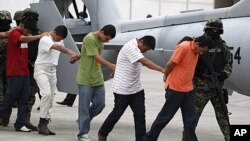Drug trafficking and transnational criminal organizations continue to pose a daunting threat to the rule of law in Latin America. According to U.S. Assistant Secretary of State for International Narcotics and Law Enforcement Affairs William Brownfield, the nature of that threat has constantly evolved over the past ten to 15 years and is creating new policy challenges.
In response to the changing nature of the threat, the United States has developed new cooperative networks that link the U.S. to other countries and regional organizations in the hemisphere.
U.S. strategies have evolved to meet the challenges. In Colombia, for instance, it became clear that dismantling drug cartels was a necessary step toward reducing crime and insecurity, but it was not sufficient. Only by extending the rule of law, increasing the presence of the state, and bolstering respect for human rights, could real security take root in Colombia.
Transnational criminal organizations adapt and evolve quickly. When faced with law enforcement opposition in Colombia, the drug trafficking center of gravity took hold in Mexico, creating perilous new security concerns throughout the country. The United States and Mexico responded with the 2007 Merida Initiative. As a result, the Mexican government has undertaken a comprehensive effort to reform its law enforcement and judicial institutions to confront transnational criminal organizations and disrupt their activities.
The success of efforts in Colombia and Mexico has put pressure on Central America, where drug cartels, transnational gangs and organized crime are taking advantage of porous borders, weak government presence in remote areas, and inadequate law enforcement and rule of law capabilities to expand their operations.
In recognition of these emerging security threats, the United States launched the Central America Regional Security Initiative, and President Obama sought to enhance U.S. impact in the region when he launched the Central America Citizen Security Partnership in March 2011. This new partnership throughout the region recognizes that to combat transnational threats effectively, the United States and like-minded donors must work with the nations of the region to build partner-nation law enforcement and rule of law capacity, while simultaneously addressing the underlying causes of crime and insecurity.
The United States firmly believes that credible law enforcement capacity and systems of justice provide the foundation for criminal information sharing, judicial cooperation, human rights, counternarcotics, and counterterrorism programs to take hold.
Emerging Threats In Western Hemisphere

Drug trafficking and transnational criminal organizations continue to pose a daunting threat to the rule of law in Latin America.





















